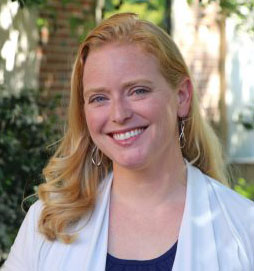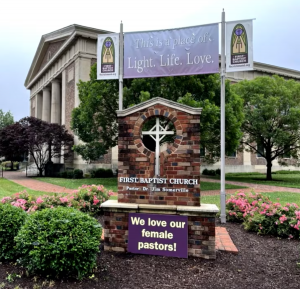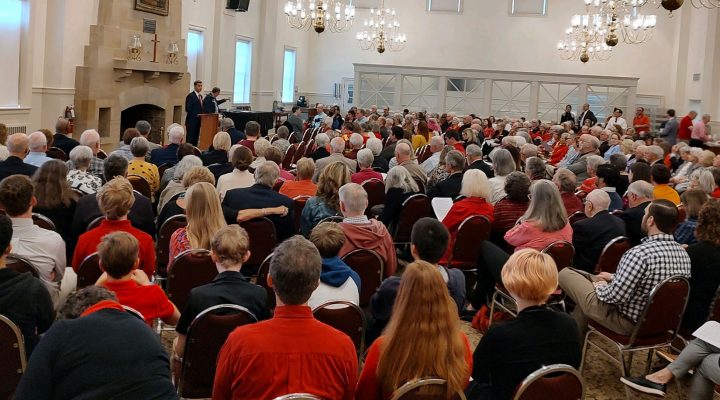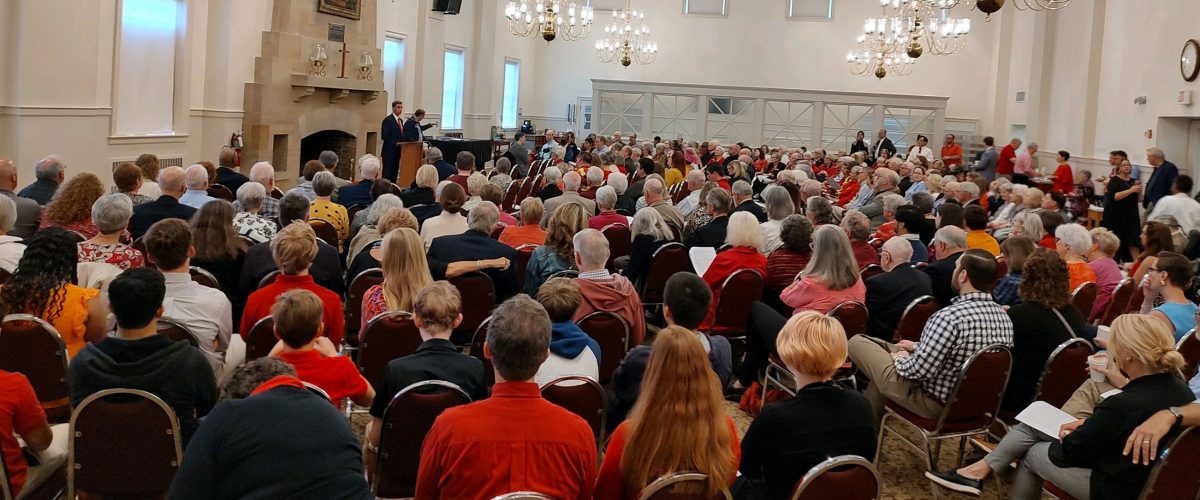On May 19, First Baptist Church of Richmond, Va., made Baptist history by voting to leave the Southern Baptist Convention in support of women in ministry. Their decision wasn’t driven by hatred for the SBC or a desire to move away from Baptist principles. Instead, they looked to their historic past and decided they wanted to be part of a better historic future.
In 1845, Jeremiah Bell Jeter, then pastor of First Baptist, helped form the Southern Baptist Convention, and that same year, the SBC’s mission organization now known as the International Mission Board found its first home in the Richmond church’s basement. Both organizations began in large part because they supported the employment of slave owners.

Allison Collier
Allison Collier, associate pastor of Christian formation at First Baptist, commented on the growing consensus that the church “helped start the SBC for the wrong reasons then, and are hoping to pull out of the SBC for the right ones now.”
The church’s mission statement is: “Bringing the kingdom of heaven to Richmond VA and beyond.” Collier interprets this statement as a call to notice the things that don’t look like heaven and to get to work fixing them. She says the church was coming to realize that “the kingdom of heaven doesn’t look like a bunch of white men sitting around making all the decisions.”
“The kingdom of heaven doesn’t look like a bunch of white men sitting around making all the decisions.”
So in June 2023, when the SBC passed the first reading of the Law Amendment, which disqualifies SBC-affiliated churches from affirming, appointing or employing women as pastors of any kind, First Baptist Richmond knew they had to start having serious conversations about their relationship with the SBC. The church created a subcommittee to evaluate the church’s relationship with the SBC and suggest next steps.
In the meantime, the church was committed to showing support for women. They published a video, highlighting the stories of their three female pastors. They made signs for outside the church that read, “We support our female pastors!”
The senior pastor, a strict Lectionary preacher, broke from his normal preaching rhythm in favor of a series addressing the value and importance of women in ministry. Collier said she and the other females on staff felt incredibly loved and supported inside the church.
While the church supported the women inside its walls, its decision to make a more public statement about women in ministry did not come as easily. Like many churches contemplating leaving the SBC, a large point of contention was what the church would do with its missions money. Many current and former IMB missionaries attend the Richmond church, and the IMB is located within walking distance from the church. Historically, a great deal of church finances went to supporting the IMB.

Sign outside First Baptist Richmond
While the church supported Collier and other women in ministry like her, it struggled with the implications of revoking financial support to the IMB and severing their long-standing ties with the SBC.
When the deacons met in April 2024 to discuss the findings of the subcommittee and the relationship between the SBC and the church, there were many opinions about the best way forward. Collier spoke up saying, “If you love me inside the church, why can’t you say that to people outside these walls? It stings that you can’t say that to the SBC.”
She challenged church members to think about the example they are setting for young people. Women are called to the baptismal waters, but they are also equally called to kingdom work. Finally, she reminded the church they have been a historical and flagship church to many, and “if the church wants to continue being an example, it has to stand for something instead of getting kicked out along the way.”
“While the church supported Collier and other women in ministry like her, it struggled with the implications of revoking financial support to the IMB.”
At the conclusion of the meeting, the deacons asked for a special-called business meeting where the church would vote on separating from the SBC.
In preparation for the vote, a copy of the subcommittee’s findings and information about the “four fragile freedoms” Baptists adhere to was given to church members, and on the day of the meeting, hundreds of people showed up. After a few minutes of discussion, mostly about the missions money, someone called for a vote to leave the SBC and it passed by an overwhelming majority.
Surprisingly, when the vote passed, there was no huge sigh of relief or celebration. Instead, a feeling like grief settled over the room, Collier said. “We all grew up in the SBC. They raised us, educated us, and employed us. The SBC is all we know, and it has been our family for a long time.”
Yet in this moment, the church looked at the denomination they helped create and that helped raise them and said, “We don’t agree, and we have a firm sense that supporting female pastors is the right thing,” she explained.
In the wake of their decision, the work is far from over at First Baptist Richmond. The church must determine how to allocate missions money now, which opens possibilities for more strategic partnerships. Church leaders like Collier also are exploring new small-group curricula not based inside the SBC.
According to her viewpoint, the church is now living more fully into its mission statement of “bringing the kingdom of God to Richmond and beyond.”
Hannah Brown is a student at Baylor University’s George W. Truett Theological Seminary in Waco, Texas.
Related articles:
This is what support looks like: The Harrisonburg Baptist Church story
The Sunday we left the Southern Baptist Convention | Opinion by Jim Somerville
Virginia church with historic ties to SBC will vote on leaving due to Law Amendment
Second vote on Law Amendment will take the spotlight at this summer’s SBC annual meeting


